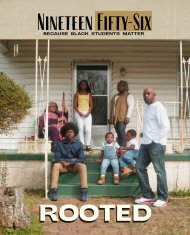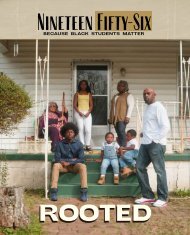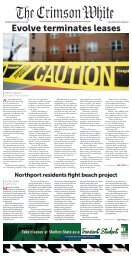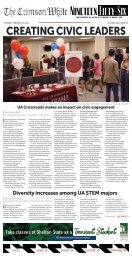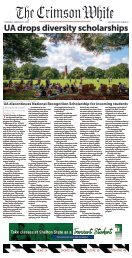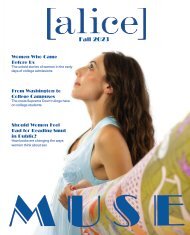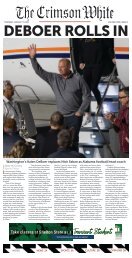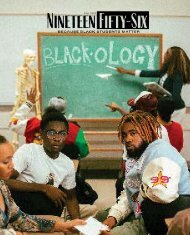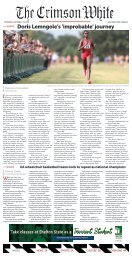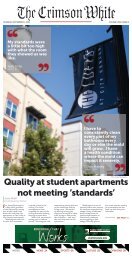CW + 1956 Collab Edition
In this first-ever collaborative issue between Nineteen-Fifty-Six and The Crimson White, we bring you stories of frustration and hope, change and stagnation, raging against the machine and working to change it from within. We hope you enjoy reading it as much as we enjoyed making it for you.
In this first-ever collaborative issue between Nineteen-Fifty-Six and The Crimson White, we bring you stories of frustration and hope, change and stagnation, raging against the machine and working to change it from within. We hope you enjoy reading it as much as we enjoyed making it for you.
You also want an ePaper? Increase the reach of your titles
YUMPU automatically turns print PDFs into web optimized ePapers that Google loves.
like the organization’s complicated<br />
history with the Machine and a lack of<br />
representation in the past.<br />
There was even discussion about<br />
Machine interference in the<br />
appointment of the first Vice President<br />
of Diversity, Equity and Inclusion.<br />
“Obviously, I feel like those connotations<br />
are still present when you look at<br />
demographics of who’s in SGA, but I<br />
think that’s something we can work<br />
past,” Brown said.<br />
While trying to connect with groups<br />
who hold negative views of SGA,<br />
McTier prides herself on fostering<br />
diverse friendships. Through these<br />
friendships, she hears different<br />
feedback and perspectives, so she<br />
can create programming and push<br />
for change that truly includes<br />
and benefits everyone.<br />
“At the end of the day, it still can<br />
be a little difficult to balance, too,”<br />
McTier said.<br />
‘LISTENING TO HEAR’<br />
The cabinet has come to realize that<br />
even while trying to be intentional<br />
and create programming that is<br />
fair in its representation of all<br />
individuals, there will still be times<br />
when controversy arises. Ivory thinks<br />
those moments of controversy can<br />
sometimes be important gateways to<br />
productive conversations.<br />
She described how OneUA week,<br />
an event hosted by the Division<br />
of Diversity, Equity and Inclusion<br />
featuring “A conversation with Jane<br />
Elliott focusing on power, perception<br />
and prejudice,” led to some backlash.<br />
“Although it may have been crazy<br />
hectic in the moment, I think it<br />
opened a real dialogue that this<br />
campus needs to have,” Ivory said.<br />
“[We need] opportunities for people<br />
to ask questions, and to have those<br />
conversations and to understand how it<br />
may make other people feel.”<br />
Brown agreed, noting that, especially<br />
now, it’s important that people are<br />
being truly heard and that leaders<br />
are “listening to hear rather than<br />
listening to speak.”<br />
“When people don’t feel heard, they<br />
kind of attack, and they kind of lash<br />
out,” Brown said. “So, I feel like it’s<br />
important to be able to discuss what’s<br />
happening in the world right now,<br />
and that affects what’s happening<br />
on campus and what’s happening in<br />
individual lives.”<br />
Above all, Brown said, it’s important to<br />
“just be there” for people at this time.<br />
“So many people have questions, and<br />
they don’t know how to ask them,<br />
or they’re afraid that they’ll offend<br />
somebody by asking them,” Brown said.<br />
“So it’s learning how to ask questions,<br />
right. It’s learning to be open to listen,<br />
be open to answer questions because<br />
people really want to know.”<br />
Ivory said within both SGA and the<br />
campus community as a whole, the DEI<br />
Cabinet is creating those spaces where<br />
people can ask genuine questions and<br />
educate themselves.<br />
“I think especially after all of the events<br />
of the summer, we felt an obligation to<br />
make sure we were doing more than<br />
putting on a virtual event, but doing<br />
things that were meaningful,” McTier<br />
said. “So, by no means are we perfect<br />
and by no means have we absolutely<br />
achieved that goal, but something that’s<br />
in the forefront of our minds is how<br />
do we make sure students are actually<br />
impacted and not just watching a video<br />
and twiddling their thumbs on their<br />
phone when they should be learning<br />
something really special and unique to<br />
our UA community.”<br />
A HUGE RESPONSIBLITY<br />
McTier referenced responses from<br />
the post-event surveys for the DEI<br />
Certificate Program as reassuring<br />
signs that students are ready<br />
and willing to learn.<br />
She said the most interesting responses<br />
were from students, usually freshmen,<br />
who were exposed to opposing opinions<br />
for the first time.<br />
“This is their first time ever hearing<br />
about LGBT history; this is their first<br />
time ever hearing about race relations<br />
from a different perspective,” McTier<br />
said. “So it’s always interesting to<br />
read through someone’s response<br />
and see the aha moment when they<br />
realize like, ‘Oh maybe I should<br />
reconsider the way that I believed,’ or,<br />
‘I actually am now very invested, and I<br />
want to learn more.’”<br />
McTier said that kind of feedback is<br />
encouraging but also creates a huge<br />
responsibility on her part.<br />
“Now, I’ve got to offer them the<br />
opportunities to be able to grow, and<br />
offer them tangible solutions to helping<br />
them grow in their knowledge of being<br />
more diverse and more inclusive,”<br />
McTier said.<br />
As a result of the progress the program<br />
has yielded, McTier is currently working<br />
on getting the DEI Certificate Program<br />
added to the SGA Code of Laws, which<br />
will make the program mandatory for<br />
future vice presidents to hold each year.<br />
However, McTier doesn’t think it’s<br />
feasible, as of now, for SGA to make<br />
the program mandatory training<br />
for all students.<br />
“We still have a very, very long way to<br />
go,” McTier said.<br />
She said she’s proud to look back at her<br />
last four years here at The University of<br />
Alabama and see how much progress<br />
has been made each year.<br />
“But then I also have to take a step<br />
back, out of my current UA student<br />
self, and realize that it took until 2017<br />
for us to start having conversations<br />
about needing to have diversity at the<br />
forefront of our conversations, and that<br />
by itself is problematic alone,” McTier<br />
said. “So, I think there is still so much<br />
to be done.”<br />
19





